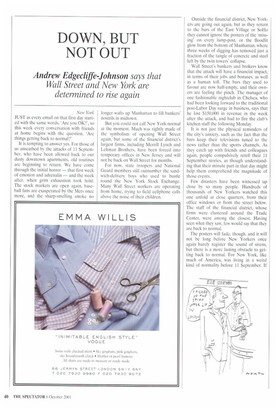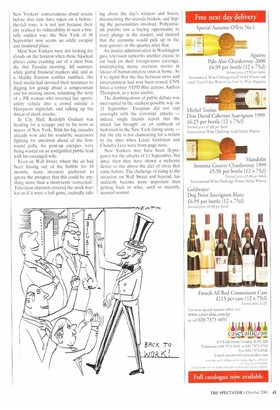DOWN, BUT NOT OUT
Andrew Edgeeliffe-Johnson says that
Wall Street and New York are determined to rise again
New York JUST as every email on that first day started with the same words, Are you OK?', so this week every conversation with friends at home begins with the question. 'Are things getting back to normal?'
It is tempting to answer yes. For those of us unscathed by the attacks of 11 September, who have been allowed back to our dusty downtown apartments. old routines are beginning to return. We have come through the initial horror — that first week of emotion and adrenalin — and the week after, when grim exhaustion took hold. The stock markets are open again, baseball fans are exasperated by the Mets once more, and the sharp-smelling smoke no
longer wafts up Manhattan to fill bankers' nostrils in midtown.
But you could not call New York normal at the moment. Much was rightly made of the symbolism of opening Wall Street again, but some of the financial district's largest firms, including Merrill Lynch and Lehman Brothers, have been forced into temporary offices in New Jersey and will not be back on Wall Street for months.
For now, state troopers and National Guard members still outnumber the sandwich-delivery boys who used to bustle round the New York Stock Exchange. Many Wall Street workers are operating from home, trying to field cellphone calls above the noise of their children. Outside the financial district, New Yorkers are going out again, but as they return to the bars of the East Village or SoHo they cannot ignore the posters of the 'missing' on every lamp-post, or the floodlit glow from the bottom of Manhattan, where three weeks of digging has removed just a fraction of the tangle of concrete and steel left by the twin towers' collapse.
Wall Street's bankers and brokers know that the attack will have a financial impact, in terms of their jobs and bonuses, as well as a human toll. The bars they used to favour are now half-empty, and their owners are feeling the pinch. The manager of one fashionable nightclub in Chelsea, who had been looking forward to the traditional post-Labor Day surge in business, says that he lost $150,000 in revenue in the week after the attack, and had to fire the club's kitchen staff the following Monday.
It is not just the physical reminders of the city's anxiety, such as the fact that the bars keep their televisions tuned to the news rather than the sports channels. As they catch up with friends and colleagues again, people compulsively retell their 11 September stories, as though understanding that their minute part in that day might help them comprehend the magnitude of those events.
Few disasters have been witnessed up close by so many people. Hundreds of thousands of New Yorkers watched this one unfold at close quarters, from their office windows or from the street below. The staff of the financial district, whose firms were clustered around the Trade Center, were among the closest. Having seen what they saw, few would say that they are back to normal.
The posters will fade, though, and it will not be long before New Yorkers once again barely register the sound of sirens, but there is a more lasting obstacle to getting back to normal. For New York, like much of America, was living in a weird kind of normality before 11 September. If New Yorkers' conversations about events before that date have taken on a beforethe-fall tone, it is not just because their city realised its vulnerability in such a brutally sudden way; the New York of 10 September now seems an oddly escapist and insulated place.
Most New Yorkers were not looking for clouds on the horizon when those hijacked planes came crashing out of a clear blue sky that Tuesday morning. All summer, while global financial markets slid, and as a Middle Eastern conflict rumbled, the local media had devoted their resources to digging for gossip about a congressman and his missing intern, rehashing the story of a PR woman who reversed her sportsutility vehicle into a crowd outside a Hamptons nightclub, and talking up the threat of shark attacks.
In City Hall. Rudolph Giuliani was heading for a scrappy end to his term as mayor of New York. With his big crusades already won and his would-be successors fighting for attention ahead of the firstround polls, his pent-up energies were being wasted on an undignified public feud with his estranged wife.
Even on Wall Street, where the air had been hissing out of the bubble for 18 months, many investors preferred to ignore the prospect that this could be anything more than a short-term 'correction'. Television channels covered the stock market as if it were a ball game, excitedly talk
ing about the day's winners and losers, documenting the records broken, and hyping the personalities involved. Pollyannaish pundits saw a buying opportunity in every plunge in the market, and insisted that the economy would pick up in the next quarter, or the quarter after that.
An insular administration in Washington gave television networks another excuse to cut back on their foreign-news coverage, underplaying messy overseas stories in favour of human-interest ones at home. As if to signal that the line between news and entertainment had now been erased, CNN hired a former NYPD Blue actress, Andrea Thompson. as a news anchor.
The dumbing-down of public debate was interrupted in the starkest possible way on 11 September. Escapism did not end overnight with the terrorists' attacks — indeed, single friends report that the attack has brought on an outbreak of hedonism in the New York dating scene — but the city is not clamouring for a return to the days when Lizzie Grubman and Chandra Levy were front-page news.
New Yorkers may have been ill-prepared for the attacks of 11 September, but since then they have shown a welcome desire to rise above the diet of trivia that came before. The challenge of rising to the occasion, on Wall Street and beyond, has suddenly become more important than getting back to what, until so recently, seemed normal.



































































































 Previous page
Previous page